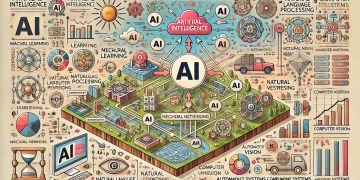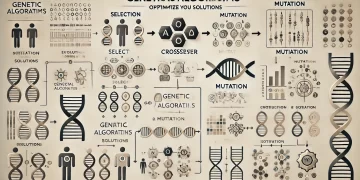Artificial Intelligence (AI) has transformed the marketing and advertising industry by enabling businesses to analyze consumer behavior, optimize advertising campaigns, and personalize customer interactions. AI-powered tools enhance content creation, customer segmentation, predictive analytics, and ad targeting. This article explores various AI use cases in marketing and advertising, detailing how AI is reshaping consumer engagement strategies.
1. AI-Powered Customer Insights and Analytics
AI enables marketers to analyze vast amounts of consumer data to uncover patterns, preferences, and behaviors. Machine learning algorithms process historical data to predict future trends, allowing businesses to refine their marketing strategies. AI-driven analytics platforms provide real-time insights into customer interactions, optimizing decision-making processes.
2. Personalized Marketing and Customer Segmentation
AI enhances personalization by segmenting customers based on demographics, behavior, and preferences. AI-powered recommendation engines suggest relevant products and services, improving customer engagement and conversion rates. Companies like Amazon and Netflix use AI-driven algorithms to deliver highly personalized experiences.
3. Automated Content Generation and Optimization
AI-powered tools such as GPT-based models create high-quality content, including blog posts, social media updates, and email campaigns. AI-driven content optimization platforms analyze engagement metrics and suggest improvements to enhance visibility and reach. Automated content generation saves time and ensures consistent brand messaging.
4. AI-Driven Chatbots and Virtual Assistants
AI chatbots and virtual assistants provide real-time customer support, answer queries, and assist with product recommendations. Businesses use AI-driven chatbots on websites, social media, and messaging apps to enhance customer engagement and streamline communication. AI-powered assistants also help in lead generation and conversion optimization.
5. Programmatic Advertising and AI-Powered Ad Targeting
AI revolutionizes digital advertising by enabling programmatic ad buying, where machine learning algorithms analyze user behavior and serve highly targeted ads. AI-driven ad platforms optimize bidding strategies, audience segmentation, and placement decisions in real time, maximizing return on investment (ROI).
6. Sentiment Analysis for Brand Reputation Management
AI-powered sentiment analysis tools monitor social media, customer reviews, and online discussions to gauge public perception of a brand. Businesses use AI-driven insights to manage reputation, address negative feedback, and adjust marketing strategies accordingly. Sentiment analysis helps brands stay responsive to consumer sentiment in real time.
7. AI in Influencer Marketing
AI helps brands identify relevant influencers based on audience engagement, demographics, and authenticity. AI-driven influencer marketing platforms analyze influencer credibility and predict campaign success. Businesses leverage AI to streamline influencer collaborations and maximize campaign effectiveness.
8. Predictive Analytics for Campaign Optimization
AI-powered predictive analytics assess past marketing campaign performance and forecast future outcomes. Machine learning models analyze customer interactions, purchase history, and engagement patterns to refine targeting strategies and improve campaign effectiveness.
9. AI in Visual Recognition and Video Marketing
AI-powered visual recognition technology analyzes images and videos to enhance ad targeting. Brands use AI-driven tools to recognize objects, faces, and emotions in multimedia content. AI enhances video marketing by generating automated subtitles, recommending video edits, and optimizing video performance across platforms.
10. AI for Email Marketing Optimization
AI-driven email marketing platforms analyze recipient behavior to optimize email content, timing, and frequency. AI-powered subject line generators and personalized email campaigns increase open rates, click-through rates, and overall engagement. AI enables marketers to automate A/B testing and refine email strategies for better results.
Conclusion
AI is revolutionizing marketing and advertising by providing advanced data analytics, personalization, and automation. From AI-driven customer insights to programmatic advertising, businesses leveraging AI gain a competitive advantage in the digital landscape. As AI technology continues to evolve, its impact on marketing and advertising will expand, driving innovation and efficiency in consumer engagement strategies.
References
- McKinsey & Company. (2023). “AI and the Future of Digital Marketing.”
- Harvard Business Review. (2022). “How AI is Transforming Advertising Strategies.”
- Deloitte Insights. (2023). “AI-Driven Customer Segmentation and Personalization.”
- PwC. (2023). “The Role of AI in Programmatic Advertising.”
- Gartner. (2022). “AI-Powered Content Generation and Optimization.”
- Forrester Research. (2023). “AI in Sentiment Analysis and Brand Reputation Management.”




































